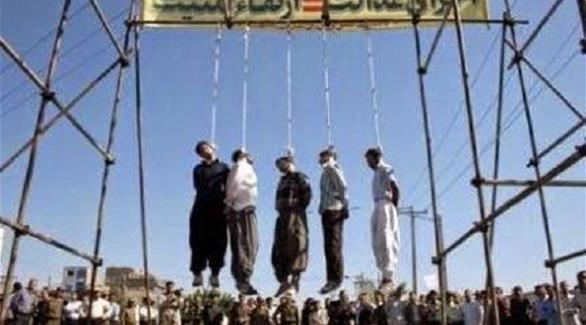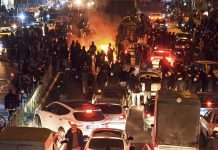The idea of reconciliation with Iran is fruitless
Abdulrahman al-Rashed/Al Arabiya/Sunday, 2 August 2015
It’s not difficult for Arab Gulf countries to shake hands with Iranian president Hassan Rowhani, sign a friendship agreement with Iran and end the disagreement which lasted for thirty years. Theoretically, this is very easy; however it will be an agreement that is not even worth the ink used to sign it if there are no guarantees. My friend and colleague Turad el-Amri wrote an article dedicating it to me and another colleague and expressed an opinion and vision of a roadmap that defies our warnings of Iran.
If Amri was popular in the Iranian supreme guide’s court or if his word counted at the White House, I may have changed my mind and adopted his suggestion of openness to Iran. However, he’s like me and other writers, his word is all he’s got to sell. Arab Gulf governments cannot bet on the lives of thirty million citizens on the basis of good intentions and personal analysis of events.
In his op-ed published in An7a, he spoke of what he called a Gulf initiative for peace, which is merely “Turad’s initiative for peace!” Such an initiative is worthless if the regional governments do ensure that Iran really changes its hostile policy towards them, diminishes its military capabilities against them or that superpowers are needed to provide military guarantees as a form of insurance against Iranian threats. None of these conditions are present and good intentions are not enough in the real world.
Easy to sign a deal, but..
It’s easy for superpowers like the United States, who’s more than 7,000 kilometers away from Iran, to sign a deal with the latter as it possesses a huge arsenal of technological, military and financial intelligence units – capabilities it can use to deter, prevent and annihilate. However, Gulf countries are a stone throw away from Iranian shores and with our limited capabilities, we cannot be reassured with promises of good intentions. Gulf countries need proofs and guarantees that Iran changed after signing the agreement with the West or they are forced to fortify themselves.
States are like individuals, you can tell how they are through their biography and behavior and it’s not enough to analyze their intentions by saying that Iran’s aim of signing the nuclear deal with the West is to end the siege against it and ensure the safety of its existence. To begin with, sanctions against Iran were imposed due to its hostile behavior and not the other way around. There’s a long list detailing Iran’s offensives since the 1980s till present from the Philippines to Argentina.
Iran thus brought the siege and sanctions upon itself. Iran’s enmity towards Israel is not for the sake of defending the Palestinians, as Turad believes, and it’s actually part of the expanded regional struggle. It’s in the name of Palestine that Iran manages a hostile expanded system that’s formed of Bashar al-Assad in Syria, Hassan Nasrallah in Lebanon, Mahmoud al-Zahar and Ramadan Shalah in Gaza, Nayef Hawatmeh in Syria, Mohamed Badie in Egypt, Watheq al-Battat in Iraq and Abdullah al-Houthi in Yemen. All those have nothing to do with defending Palestine. It’s enough to realize that by just looking at what’s happening in the Palestinian refugee camp of Yarmuk in Damascus where groups affiliated with Palestinian parties and linked to Iran are committing hideous crimes.
There’s a long list detailing Iran’s offensives since the 1980s till present from the Philippines to Argentina
There are massive hostile military and political operations implemented by Iran or its proxies against us. These operations date back to the days of the Iranian revolution and they are neither directed against Israel nor against the West.
I don’t want to exhaust everyone by addressing all the details of Amri’s article as they are irrelevant had we thought well of the brothers in Tehran. Brother Turad, it’s not new for us to understand and analyze the dispute with Iran. Gulf countries have previously believed Tehran, tried to extend their hands to it and opened their borders and capitals to it only to realize later that the Iranian regime’s hostility towards them has increased. In the 1990’s, they held several negotiation sessions with it and even signed an important detailed agreement in 2001. However, Iran pretty much violated the entire agreement and all its pledges.
In 2008, Saudi Arabia hosted Sheikh Hashemi Rafsanjani and it was the longest visit of its kind as he stayed for two weeks and toured Jeddah, Dammam, Khobar, Jubail, Qatif, Makkah, Medina and Yanbu. Embassies were reopened and Iranian airlines were allowed to open offices there. Riyadh received Iranian businessmen and hosted them at showrooms and princes, ministers and military figures exchanged visits. In the end, Saudi Arabia found out that someone within the Iranian regime wanted to exploit good intentions and good relations in order to smuggle arms, recruit the opposition and conspire against the Saudi kingdom.
Therefore, some people’s suggestions of the importance of reconciliation with Iran are actually common sense but they are not enough without guarantees that protect the Arab Gulf countries from the hostility Iran is surrounding us with in Iraq, Syria, Lebanon, Bahrain, Yemen and Sudan. I like to reassure doves in the Gulf, including brother Turad, that despite the dispute with Tehran, our traditional relations with brothers in Iran are alive and well. There are currently ambassadors and embassies between the Gulf and Iran and there are Saudis who visit Iran and Iranians who visit Saudi Arabia for Hajj and Umrah. However, apprehension against Iran has approached the maximum and is increasing due to the ending of financial, military and diplomatic sanctions against it.
فكرة المصالحة مع إيران فاشلة
عبد الرحمن الراشد/الشرق الأوسط/02 آب/15
ليس صعباً على دول الخليج العربية مصافحة الرئيس حسن روحاني، وتوقيع اتفاق صداقة مع بلاده إيران، وطي خلاف ثلاثين سنة. نظرياً، هذا أمر سهل جداً لكنه يبقى اتفاقاً لا يساوي الحبر الذي يوقع به إن لم تكن له ضمانات. الصديق الأستاذ طراد العمري أهداني في مدونته مقالاً، عبر فيه عن رأي وخريطة طريق تتحدى تحذيرنا من إيران. ولو كانت للأخ طراد حظوة في بلاط المرشد، أو له كلمة في البيت الأبيض، ربما غيرت رأيي، وسرت خلف اقتراحه بالانفتاح على إيران. لكنه مثلنا، بضاعته رأيه. وكذلك حكومات الخليج، لا تستطيع أن ترهن مصير ثلاثين مليون مواطن فقط على حسن النوايا، والتحليل الشخصي للأحداث. في مقاله /192075/http://www.an7a.com تحدث عن شيء سماه المبادرة الخليجية للسلام، وهي ليست سوى «مبادرة طراد للسلام»! لا قيمة لها دون أن تتأكد حكومات المنطقة أن إيران فعلاً غيرت سياستها العدوانية تجاهها، أو قلصت قدراتها العسكرية الموجهة ضدها، أو قدمت دول كبرى ضمانات عسكرية كتأمين عليها. لا شيء من هذه الشروط موجودة والنوايا الحسنة لا تكفي في العالم الحقيقي.
سهل على دولة عظمى مثل الولايات المتحدة تقع على أبعد من سبعة آلاف كيلومتر أن توقع اتفاقا مع ايران، لأن بحوزتها ترسانة ضخمة من السلاح، وذراع طويلة، وتقنية رصد استخبارات عسكرية، ومعلوماتية، ومالية، تستطيع بها أن تردع وتمنع وتمحق. اما نحن، فنسكن على مرمى حجر من شاطئ ايران، وبإمكانياتنا المحدودة لا نستطيع ان ننام على وعود النوايا الحسنة. دول الخليج تحتاج الى براهين او ضمانات على ان ايران تغيرت بعد الاتفاق مع الغرب، او هي مضطرة لتحصين نفسها!
والدول مثل الأفراد، تعرفها من سيرتها وسلوكها، ولا يكفي ان نحلل نواياها، بالقول مثلاً ان كل هدف ايران كان توقيع اتفاق مع الغرب يرفع الحصار ويؤمن سلامة وجودها. أصلاً العقوبات ضدها طبقت بسبب سلوكها العدواني، وليس العكس. توجد قائمة طويلة بعملياتها العدوانية منذ مطلع الثمانينات الى هذه اللحظة، من الفلبين الى بيونس آيرس، وهي التي تسببت في استحداث الحصار والعقوبات. اما عداؤها لإسرائيل فهو ليس دفاعا عن الفلسطينيين، كما يصدق الأخ طراد، بل جزء من الصراع الإقليمي الواسع. باسم فلسطين، تدير ايران منظومة عدوانية واسعة، اطرافها الأسد في سوريا، ونصر الله في لبنان، والزهار وشلح في غزة، وحواتمة في سوريا، ومحمد بديع في مصر، والبطاط في العراق، وعبد الله الحوثي في اليمن. كل هؤلاء لا علاقة لهم بالدفاع عن فلسطين. يكفيك ان تعرف ما يجري في مخيم اليرموك الفلسطيني في محيط دمشق، من جرائم مروعة تقوم بها جماعات محسوبة على منظمات فلسطينية تابعة لإيران. يوجد كم هائل من النشاطات العدائية عسكرية وسياسية، تنفذها ايران، او جماعات تعمل وكيلة لها، موجهة ضدنا، وهي قديمة قدم الثورة الايرانية، ليست ضد اسرائيل ولا ضد الغرب. مقال الراشد ولا أودّ ان أرهق الجميع بتفنيد ما كتبه عن الأساطير الثلاثة، لانها غير مهمة اذا احسنا الظن في الإخوة في طهران. اخ طراد لسنا جددا في فهم الخلاف وتحليله. لقد سبق لدول الخليج ان صدقت، وحاولت، وجربت، ومدت يدها الى طهران وفتحت حدودها وعواصمها، ثم اكتشفت بعد ذلك ان النظام الإيراني زاد عدوانية ضدها. سبق ان عقدت في التسعينات لقاءات تفاوضية متعددة، بل ووقعت اتفاقية تفصيلية مهمة في عام 2001. تقريبا خالفت ايران كل ما ورد وتعهدت به فيها. ومرة ثالثة حاولت السعودية واستقبلت الشيخ هاشمي رفسنجاني في عام 2008 في أطول زيارة من نوعها، جال لأسبوعين في جدة، والدمام، والخبر، والجبيل، والقطيف، ومكة، والمدينة، وينبع. وفتحت السفارات من جديد، وسمحت للطيران الإيراني بفتح مكاتب له، واستقبلت الرياض رجال اعمال ايرانيين واقامت لهم معارض تجارية، وتبادل الزيارات أمراء ووزراء وعسكريون. في الأخير تكتشف السعودية ان داخل النظام الإيراني من أراد استغلال طيب النية وحسن العلاقة لتهريب أسلحة، وتجنيد معارضة، والتآمر داخليا وخارجيا. وبالتالي، ما يطرحه البعض عن ضرورة التصالح مع ايران يعبر عن منطق سليم لكنه لا يكفي دون ضمانات تحمي الخليج من حالة السعار العدوانية الايرانية التي تحاصرنا بها، في العراق وسوريا ولبنان والبحرين واليمن والسودان. وأحب ان اطمئن الحمائم الخليجيين، وبينهم الأخ طراد، بأنه رغم الخلاف علاقتنا التقليدية مع الإخوة في ايران حية تتنفس. فاليوم يوجد بيننا سفراء وسفارات، وهناك سعوديون يسافرون الى ايران، وإيرانيون يزورون السعودية للحج والعمرة، لكن التوجس من ايران بلغ أقصى درجاته، ويزيد بسبب فك قيودها المالية والعسكرية والدبلوماسية.





















